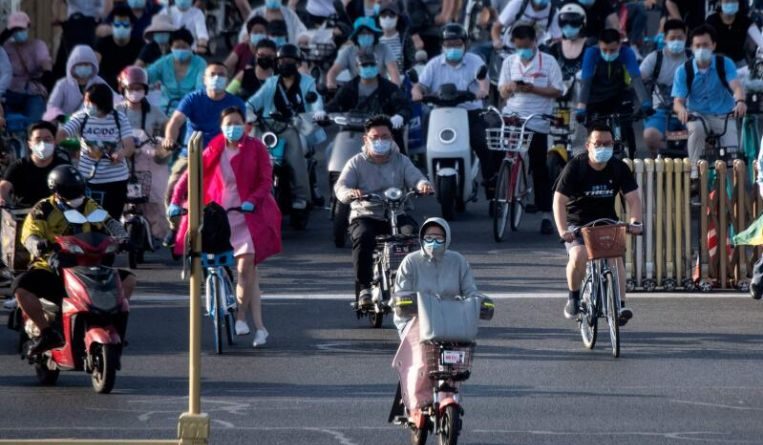COVID-19 PANDEMIC: WORLD UPDATES- How countries fare after easing lockdown rules
People wearing face masks drive their motocycles during rush hour in Beijing, on June 16, 2020.PHOTO: AFP
.
‘The 2019 Plague” Day 202

The new cases of infections in countries that have started to ease their restrictions against the coronavirus underline the immense challenges in containing the deadly pandemic.
More than eight million people have now been infected with the virus worldwide since it first emerged in China late last year – with more than 447,000 deaths.
Here’s a look at how some countries are faring after easing their lockdown rules.


CHINA
Beijing’s almost two-month lull in Covid-19 cases was disrupted when a 52-year-old man who had shopped at the Xinfadi wholesale food market was reported as a confirmed case on June 11.
The Chinese capital city was among the last few areas in China that have stuck to the highest level of a four-tier emergency response system, before lowering it to the next level from midnight on Apr 30, ahead of China’s parliamentary meetings on May 22.
It further lowered the alert to level 3 on June 6, before raising it back to level 2 on June 16, just 10 days later.
Anti-epidemic controls have now been reinstated with neighbourhoods locked down and flights in and out of Beijing cancelled, as China grapples to stem the outbreak.
The flare-up in Beijing has also spread to at least four other provinces – Sichuan, Hebei, Liaoning and Zhejiang.


SOUTH KOREA
Once the second-most infected country after China, South Korea has managed to flatten the infection curve with massive testing, aggressive contact tracing and strict social distancing.

But fears of a second wave have grown as infections spiked after social distancing measures – imposed since March 21 – were eased in April and May. New cases persisted in the mid-double digits after several new clusters developed around the capital area, including those linked to the clubbing district Itaewon.
Strict social distancing has been extended “indefinitely” in Seoul, Incheon and Gyeonggi province, until the number of new cases go down to single digit. This means public facilities such as museums and libraries will remain closed, and companies are urged to allow flexible work arrangement.


JAPAN

Tokyo’s nightlife scene is posing one of the biggest obstacles to reining in coronavirus cases. Nearly half of the 95 cases reported in the city on June 14 and June 15 were men in their 20s and 30s that work at nightclubs in Shinjuku district. Ten out of 27 cases announced on June 16 were also linked to nightlife.
The Japanese capital is seeing infections spike after coming out late last month from a state of emergency – first declared by the central government on April 7 and later expanded nationwide – that helped bring daily cases to single digits.
Although Tokyo encouraged businesses like host clubs to stay closed until the last phase of re-opening that starts on Friday (June 19) which will lift all restrictions on businesses, following the guidance was voluntarily.


NEW ZEALAND

One week after declaring itself Covid-free, New Zealand lost the status on June 16 when two women who had been given permission to leave quarantine early after arriving from Britain tested positive for the coronavirus.
The slip up saw the women leaving the facility early to see their dying parent, even though one had symptoms which she attributed to a pre-existing condition.
Prime Minister Jacinda Ardern said the defence force will now oversee quarantine facilities and strengthen border requirements.
New Zealand went into nationwide lockdown on March 26 and lifted all restrictions on June 9.


THE UNITED STATES

For a second week in a row, half a dozen US states, including Arizona, Florida and Oklahoma, were hit by a surge in new coronavirus cases and rising hospitalisations.
Health officials in many states attribute the spike to businesses reopening and Memorial Day gatherings in late May. Many states are also bracing for a possible increase in cases from tens of thousands of people protesting in the streets to end racial injustice and police brutality for the past three weeks.
California was in mid-March the first state to order citizens to stay home. States have taken different approaches to reopening with California starting last weekend to resume most retail businesses while Oregon hits the pause button on reopening.


EUROPE

Most European countries have passed the peak of the outbreak and are gradually reopening businesses and borders, as infections went gingerly down in past weeks.
But European Union officials and experts said last week the continent could face a surge of Covid-19 infections in the coming weeks caused by mass protests to demonstrate against racism after the killing in the US of a black man while he was in police custody.


SOUTH-EAST ASIA
Indonesia has overtaken Singapore as the country with the most cases in South-east Asia, with South Sulawesi and South Kalimantan emerging as new hot spots in the vast archipelago. Regions began loosening mobility rules this month, allowing places of worship, offices, restaurants and retail stores to open at half of their capacity.

Malaysia began relaxing its movement control order – imposed on March 18 – in early May when the daily number of cases reported had been falling since mid-April.
SOURCE: THE STRAITS TIMES ARCHIVES, BLOOMBERG, REUTERS


Read the latest on the Covid-19 situation in Singapore and beyond on our dedicated site here.
Get The Straits Times app and receive breaking news alerts and more. Download from the Apple App Store or Google Play Store now.
.


SIGN UP TO RECEIVE OUR EMAIL
.
The most important news of the day about the ASEAN Countries and the world in one email: [email protected]
6.18.2020









